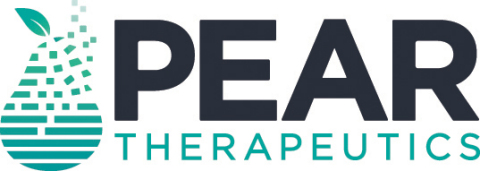Pear Therapeutics Expands Pipeline with Machine Learning, Digital Therapeutic and Digital Biomarker Technologies
Pear Therapeutics Expands Pipeline with Machine Learning, Digital Therapeutic and Digital Biomarker Technologies
- Pear is pioneering the use of software to treat disease with Prescription Digital Therapeutics (PDTs) for a range of unmet medical needs.
- Pear is accessing new technologies to expand its PDT platform. New assets present opportunities for Pear to develop PDTs in Alzheimer's disease, autoimmune disorders, depression, gastrointestinal disorders, migraine, and pain.
- Digital biomarkers combined with machine learning allow Pear to personalize and improve its PDTs, as well as to optimize the dosing regimen of pharmaceutical treatments for enhanced efficacy.
BOSTON & SAN FRANCISCO--(BUSINESS WIRE)--Pear Therapeutics, Inc., the leader in Prescription Digital Therapeutics (PDTs), announced today that it has entered into agreements with multiple technology innovators, including Firsthand Technology, Inc., leading researchers from the Karolinska Institute in Sweden, Cincinnati Children’s Hospital Medical Center, Winterlight Labs, Inc., and NeuroLex Laboratories, Inc. These new agreements continue to bolster Pear’s PDT platform, by adding to its library of digital biomarkers, machine learning algorithms, and digital therapeutics.
- Pear acquired two clinical-stage digital therapeutics for treatment of acute and chronic pain from Firsthand Technology, a leader in virtual reality for healthcare. These product candidates employ virtual reality pain relief through a combination of distraction, active physical engagement, mindfulness and biofeedback with wearable sensors. In a clinical trial the virtual reality treatment demonstrated a reduction in pain of more than 30% from baseline [1].
- Pear licensed content for a clinical-stage digital therapeutic that has demonstrated clinical utility in four randomized studies in over 600 patients with irritable bowel syndrome (IBS) from leading researchers from the Karolinska Institute, a world-renowned academic institution in Stockholm, Sweden [2-5]. This product candidate employs cognitive behavioral therapy (CBT) and other methods for treating IBS. This collaboration also includes plans to develop PDT product candidates for the treatment of other gastrointestinal and autoimmune disorders.
- Pear licensed a clinical-stage digital therapeutic for the treatment of migraine headaches from Cincinnati Children’s Hospital Medical Center, a nonprofit academic medical center and one of the oldest pediatric teaching hospitals in the United States. This solution employs CBT and patient education. Cincinnati Children’s has recently completed a clinical trial evaluating its digital therapeutic.
- Pear licensed machine learning-based voice digital biomarkers from Winterlight Labs, an innovator of technology that analyzes and assesses cognitive health. Pear licensed the technology to develop and clinically validate digital biomarkers for a variety of diseases, including Alzheimer's disease, depression, insomnia, schizophrenia, opioid use disorder, and substance use disorder.
- Pear is collaborating with NeuroLex Laboratories to collect structured voice data in patients with depression, as well as healthy volunteers. Neurolex is the developer of SurveyLex, a pioneering platform to create and distribute voice surveys. Pear intends to develop a library of real-world data from which insights may be derived to enhance the efficacy of Pear’s PDTs.
Pear’s investment in these cutting-edge technologies further supports its strategy to create the broadest and deepest toolset for the development of PDTs that redefine standard of care in a range of therapeutic areas. With access to these new technologies, Pear is positioned to develop PDTs in new disease areas, while leveraging machine learning to personalize and improve its existing PDTs.
“We are excited to announce these agreements, which expand the leading PDT platform,” said Corey McCann, M.D., Ph.D., President and CEO of Pear. "Accessing external technologies allows us to continue to broaden the scope and efficacy of PDTs.”
“The field of digital health is evolving rapidly, and PDTs are going to increasingly play a big part because they are designed to allow doctors to treat disease in combination with drug products more effectively than with drugs alone,” said Alex Pentland, Ph.D., a leading expert in voice analytics and MIT Professor. “For PDTs to make their mark in healthcare, they will need to continually evolve. Machine learning and voice biomarker algorithms are key to guide that evolution and personalization.”
About Pear Therapeutics
Pear Therapeutics, Inc. is the leader in prescription digital therapeutics. We aim to redefine medicine by discovering, developing, and delivering clinically validated software-based therapeutics to provide better outcomes for patients, smarter engagement and tracking tools for clinicians, and cost-effective solutions for payers. Pear has a pipeline of products and product candidates across therapeutic areas, including severe psychiatric and neurological conditions. Our lead product, reSET®, for the treatment of Substance Use Disorder, was the first prescription digital therapeutic to receive marketing authorization from the FDA to treat disease. Pear’s second product, reSET-O®, for the treatment of Opioid Use Disorder, received marketing authorization from the FDA in December 2018. For more information, visit us at www.peartherapeutics.com.
________________________________
1. Jones, T., Moore, T., & Choo, J. (2016). The Impact of Virtual Reality on Chronic Pain. PloS one, 11(12), e0167523. doi:10.1371/journal.pone.0167523
2. Ljótsson B, Hesser H, Andersson E, Lackner JM, Alaoui El S, Falk L, Aspvall K, Fransson J, Hammarlund K, Löfström A, Nowinski S, Lindfors P, Hedman E. Provoking symptoms to relieve symptoms: A randomized controlled dismantling study of exposure therapy in irritable bowel syndrome. Beh Res Ther. 2014 Feb 10;55C:27–39. PMID:24584055
3. Ljótsson B, Hedman E, Andersson E, Hesser H, Lindfors P, Hursti T, Rydh S, Rück C, Lindefors N, Andersson G. Internet-delivered exposure-based treatment vs. stress management for irritable bowel syndrome: a randomized trial. Am J Gastroenterol. 2011 Aug;106(8):1481–91. PMID:21537360
4. Ljótsson B, Andersson G, Andersson E, Hedman E, Lindfors P, Andréewitch S, Rück C, Lindefors N. Acceptability, effectiveness, and cost-effectiveness of internet-based exposure treatment for irritable bowel syndrome in a clinical sample: a randomized controlled trial. BMC Gastroenterol. 2011;11(1):110. PMID:21992655
5. Ljótsson B, Falk L, Vesterlund AW, Hedman E, Lindfors P, Rück C, Hursti T, Andréewitch S, Jansson L, Lindefors N, Andersson G. Internet-delivered exposure and mindfulness based therapy for irritable bowel syndrome - a randomized controlled trial. Beh Res Ther. 2010 Jun;48(6):531–9. PMID:20362976
Contacts
Media and Investors:
Meara Murphy
Director, Corporate Communications
meara.murphy@peartherapeutics.com
